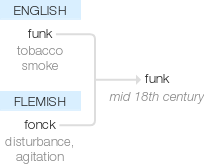Funk
mid 18th century (first recorded as Oxford University slang): perhaps from funk2 in the slang sense ‘tobacco smoke’, or from obsolete Flemish fonck ‘disturbance, agitation’.
wiktionary
1620, from French dialectal (Norman) funquer, funquier(“to smoke, reek”), from Old Northern French fungier(“to smoke”), from Vulgar Latin fūmicāre, alteration of Latin fūmigāre(“to smoke, fumigate”). Related to French dialect funkière(“smoke”). More at fumigate.
From Middle English funke, fonke(“spark”), from Old English *funca, *fanca(“spark”), from Proto-Germanic *funkô, *fankô(“spark”), from Proto-Indo-European *(s)peng-, *(s)pheng-(“to shine”). Cognate with Middle Low German funke, fanke(“spark”), Middle Dutch vonke(“spark”), Old High German funcho, funko(“spark”), German Funke(“spark”). More at spunk.
1743, Scottish and Northern English dialectal word, originally a verb meaning "to panic, fail due to panic". Perhaps from or cognate with obsolete Dutch fonck(“distress, agitation”), from Middle Dutch fonck(“perturbation, agitation”). More at flunk.
etymonline
funk (n.1)
"depression, ill-humor," perhaps from earlier sense "cowering state of fear" (1743), identified in OED as originally Oxford slang, probably from Scottish and Northern English verb funk "become afraid, shrink through fear, fail through panic," (1737), of unknown origin. Perhaps from Flemish fonck "perturbation, agitation, distress," which is possibly related to Old French funicle "wild, mad."
funk (n.2)
"bad smell," 1620s, probably from the verb funk in the sense "blow smoke upon; stifle with offensive vapor" (though this is not recorded until later 17c.). It is from dialectal French funkière "to smoke," from Old French fungier "give off smoke; fill with smoke," from Latin fumigare "to smoke" (see fume (n.)).
Not considered to be related to obsolete funk (n.) "a spark," mid-14c., fonke, a general Germanic word (compare Dutch vonk, Old High German funcho, German Funke. The Middle English word is probably from Low German or from an unrecorded Old English form.
In reference to a style of music felt to have a strong, earthy quality, it is attested by 1959, a back-formation from funky (q.v.).
